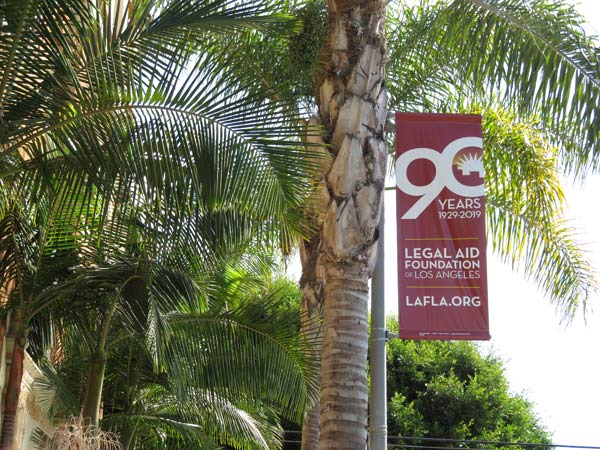California Says Emergency Rental Assistance Program Will Likely Run Out of Funds with Over 140,000 Applicants Still in Limbo
State lawyer says the program’s remaining $177 million could go to private contractor if the state is forced to comply with a Superior Court order, leaving no money for tenants.
Oakland, California – January 23, 2023 – More than 140,000 Californian households who have been waiting for over ten months for a response to their rental assistance applications may be denied their opportunity to receive rent relief because the program will run out of money, according to the state’s lawyer. In a court hearing last Thursday afternoon, a lawyer for the State of California told a judge that the state’s Emergency Rental Assistance Program would need to spend its remaining $177 million on administrative costs if forced to comply with the court’s order to provide basic constitutional due process, leaving no money for tenants. The state claims it will pay its private contractor most – if not all – of its remaining funds just to fix its flawed application process and provide basic information to tenants it believes are ineligible for assistance.
At stake at Thursday’s hearing was how the state would issue denial notices to around 104,000 renters who submitted applications over ten months ago, and another 40,000 who have pending appeals. The state was sued by community groups Alliance of Californians for Community Empowerment (ACCE Action), Strategic Actions for a Just Economy (SAJE) and PolicyLink last June for issuing flawed notices that provided little or no explanation for why an applicant was denied, making it difficult for wrongfully denied tenants to appeal. Last July, a Superior Court judge agreed the state was violating applicants’ due process rights and issued an injunction blocking the state from denying tenants until the problems were addressed. But in the past six months, most tenants have received no information about why their applications have been delayed. Now, after waiting nearly a year, many may receive no assistance, even if the state determines they are eligible. This goes back on a guarantee the state made last year when announced it was abruptly closing the rental assistance program but promised that “every eligible applicant seeking assistance for eligible costs submitted and incurred on or before March 31, 2022, would be assisted.”
On Thursday, Alameda Superior Court Judge Frank Roesch said the state’s denial notices must “specify the facts supporting the denial” to satisfy due process, meaning the notice must provide enough information for applicants to understand why the state does not believe their application meets program requirements. The Court acknowledged that being told why tenants are being denied is important to allow applicants a meaningful opportunity to appeal and correct their paperwork. The state’s lawyer argued such a requirement would be too burdensome, and the state would have to pay its remaining rent relief funds to the private contractor it hired to administer the program. Judge Roesch rejected the state’s argument and its implications that “a constitutional principle can be ignored because of budgetary reasons.”
“We’re relieved that tenants who applied for desperately needed rent relief will finally get a notice that tells them the reason they are being denied assistance, and a fair chance to appeal – that’s been our goal since this suit was filed,” said Madeline Howard, senior attorney with Western Center on Law & Poverty. “But it’s extremely frustrating that the state has been fighting so hard to avoid giving tenants this basic information that should have been provided from the start. We are alarmed by the state’s threat to use the program’s remaining funds to pay an out-of-state contractor $177 million just to tell tenants the reason they are being denied. This threat raises very serious concerns about how the Department of Housing and Community Development has managed this funding.”
“Low-income people were decimated by this pandemic—financially, physically, and emotionally—and it is the responsibility of government to provide support for residents in times of crisis such as these,” said Cynthia Strathmann, executive director of SAJE. “Instead, the state is threatening to use all of its funds to deny people the financial support they so desperately need, after spending hundreds of millions on a private contractor. This terrible irony should not be accepted.”
In court documents, California’s Department of Housing and Community Development revealed that it hired a private, for-profit company to administer the state’s rent relief program. Based in Mississippi, Horne LLP has developed a business running and profiting off of safety-net programs created in the wake of calamitous events like hurricanes, floods, and, more recently, pandemics. California has already agreed to pay Horne over $260 million to administer its program. Recent invoices show California has been charged an average of $7.72 million per month, even with the program closed to new applications and apparently at a standstill.
“The Emergency Rental Assistance Program was created to keep struggling Californians housed during an unprecedented pandemic that put millions on the brink of homelessness,” said Faizah Malik, a supervising senior attorney with Public Counsel. “However, the execution of the program has been terribly flawed. While Judge Roesch’s order helps to correct one major problem, it is fundamentally unfair for the state to now deny tenants crucial assistance because of its poor management of the program. If it is true that the state must use the remaining funds to just satisfy its constitutional obligations, it must allocate additional funds to provide the rental relief that tens of thousands of California families were promised.”
“I’m grateful the judge is on our side on this issue, but many eviction protections are expiring imminently, and HCD needs to hurry up to prevent more families from being forced to live under bridges,” said Patricia Mendoza, statewide organizer for ACCE. “The state asked us to stay home during the pandemic, and they promised that if we did so, we would be taken care of. If they want to follow through on that promise, they need to do what it takes to increase their funding to ensure tenants get the rent relief they are due now.”
“Nothing was stopping the state from reaching out to the renters who have been in limbo over the past six months to help them fix potential mistakes on their applications or ask for missing information,” said Jonathan Jager, an attorney at Legal Aid Foundation of Los Angeles. “Yet, that wasn’t done, and our neighbors and communities will pay the price.”
###
Legal Aid Foundation of Los Angeles (LAFLA) is a nonprofit law firm that seeks to achieve equal justice for people living in poverty across Greater Los Angeles. LAFLA changes lives through direct representation, systems change, and community empowerment. It has five offices in Los Angeles County, along with four Self-Help Legal Access Centers at area courthouses, and three domestic violence clinics to aid survivors.
Public Counsel is the nation’s largest provider of pro bono legal services, utilizing an innovative legal model to promote justice, hope, and opportunity in lower-income and communities of color in Los Angeles and across the nation. Through groundbreaking civil rights litigation, community building, advocacy, and policy change, as well as wide-ranging direct legal services that annually help thousands of people experiencing poverty, Public Counsel has fought to secure equal access to justice for more than 50 years.
Western Center on Law & Poverty fights in courts, cities, counties, and in the Capitol to secure housing, health care, and a strong safety net for Californians with low incomes, through the lens of economic and racial justice.



